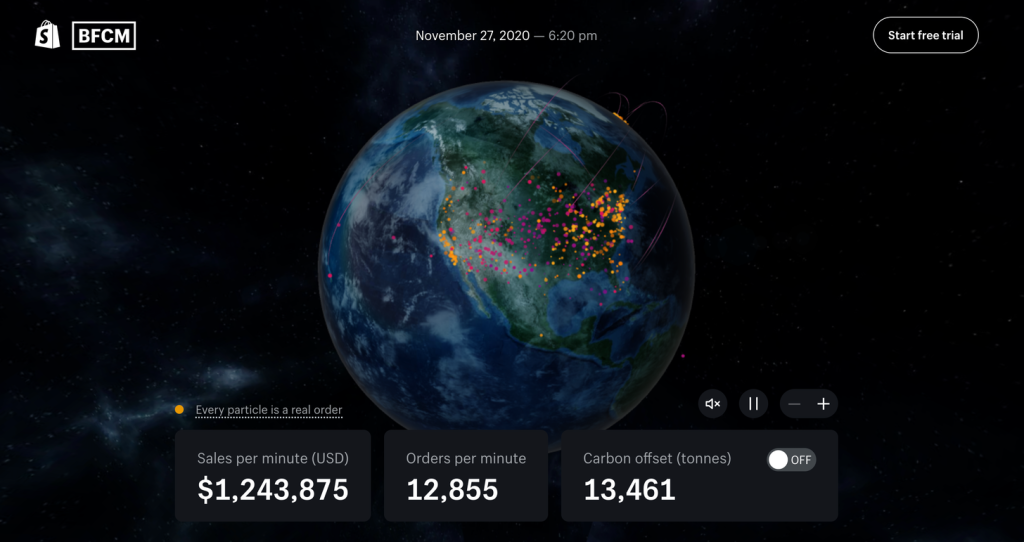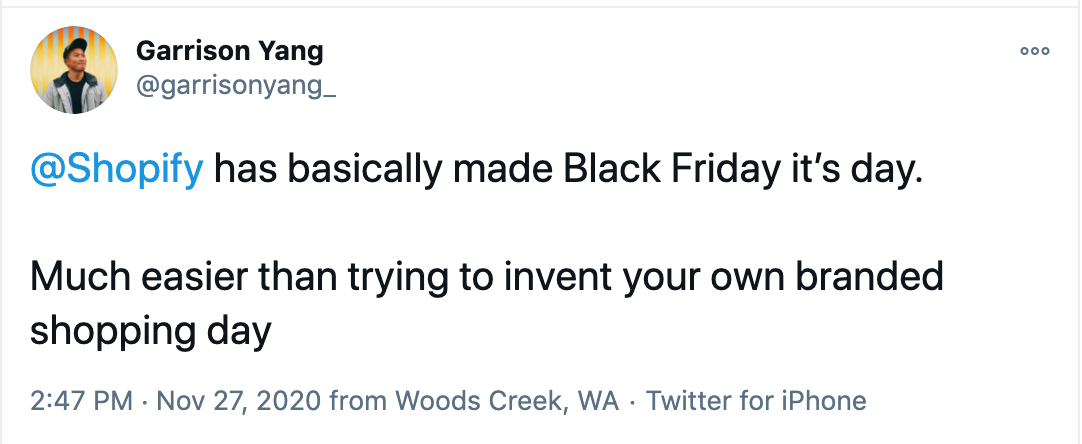

BFCM
source link: https://alexdanco.com/2020/11/28/bfcm/
Go to the source link to view the article. You can view the picture content, updated content and better typesetting reading experience. If the link is broken, please click the button below to view the snapshot at that time.
BFCM – alexdanco.comSkip to content
It’s Black Friday / Cyber Monday weekend, the biggest days of the year for Shopify. Inside our HQ, it’s just called “BFCM”, and it’s a very big deal. In our Shopify slack, you’ll find BFCM emojis ranging from the conventional ( :bfcm:, :bfcm-love: ), the exciting ( :bfcm2020_intensifies: ) and the weird ( :bfcm-kale:, :bfcm-big-effing-carrot-monster: ). It’s a pretty big event here.
It’s honestly hard not to think of BFCM numbers as a kind of “report card” for how good a job we’re doing. BFCM isn’t just a big shopping weekend; it’s actually a proof point for whether Shopify’s mission and vision about the future of commerce is coming true.
If you apply the Thiel test of “every great company believes something that other people don’t”, I think our version of it goes something like this: many people treat “shopping” and “consumerism” as roughly interchangeable concepts. But we don’t think so. One of the embedded theses inside Shopify is that shopping and consumerism are actually opposites.
Commerce is an amazing human tradition that helps everyone involved achieve mutual gain and happiness. But that doesn’t mean commerce is easy. Commerce is a challenge. It takes effort to find trading partners, build trust in them, and complete an exchange. It’s not supposed to be frictionless: the challenge of merchants and buyers discovering each other, and building trust in each other, is what it’s all about.
When we use the word “shopping”, this is what we’re getting at. Shopping isn’t best when it’s as easy as possible, but rather when it’s as meaningful as possible. There’s a reason why Shopify is so associated with Drop culture: drops are the opposite of convenience in every way. They’re also really fun.
You can contrast that mindset with a different way of buying things called “consumerism”. Consumerism is really all about one thing: making buying as easy as possible. Get all the friction out. Get all the challenge out. That approach certainly leads to a lot of buying, we’ll admit. But when that’s your goal, you’re not shopping anymore. You’re just consuming.
That’s why if your goal is to remove as much friction as possible from commerce, you end up with something like Amazon – indisputably, an extremely convenient place to buy things; but not a great place to shop at all. People ask us continuously: “When will you build a marketplace? When will you make it easier for us to buy from Shopify stores?” Yiren Lu thoughtfully wrote, in a good New York Times magazine piece the other day: Can Shopify compete with Amazon without becoming Amazon? I promise you, Shopify does not aspire to build another Amazon. We are building something quite different.
Anyone who spends time observing Shopify and watching what we build in public will notice we’ve put a lot of effort into reclaiming the word “shopping”, especially with our new consumer-facing brand, Shop. (Their motto is “Everything about shopping can be better.”) When we launched Shop to the world several months ago, a lot of people were pretty confused about what it was, because it didn’t fit their preexisting mental model of what progress looks like – “less friction, more convenience”. Parts of Shop certainly remove friction – Shop Pay is practically magic – but Shop is climbing a bigger mountain than that.
That’s why BFCM is a big deal for us. It’s really a referendum on whether shopping on the internet can succeed in a format other than “race to the bottom convenience.” None of the point of BFCM is to be convenient. BFCM is a shopping event, not a convenience event. BFCM is a weekend where we can put everything we’ve built from the past year to its real test: how are merchants using Shopify to tell their story, rouse their fans, create moments, execute drops and flash sales, and pull off something special? BFCM is more than a sale; it’s a show.
If you go to datastories.shopify.com, you can watch the show in real time. And so far, we’re off to a flying start.
By the end of Friday alone, merchants made $2.4 billion in sales around the world – 75% higher than last year, and 80% of last year’s total BFCM haul after day one. 2/3 of those sales were made from phones, and Shop helped divert 20,000+ tons of offset carbon emissions from Black Friday deliveries.
For a sense of scale of how far this has come, see this tweet from Tobi comparing a dashboard from not-so-many years ago, where you can see $2.82 million in total BFCM sales, to his our view today of $1.7 million in sales per minute.
As we finish out the weekend and get into the holiday season, shop independent wherever you can. Here are a couple places to start, helpfully curated from folks at Shopify:
Black-owned business selects, from Amena Agbaje
A gamer’s guide to gifts, from Dario Wünsch
Startup starter pack, from Harley
Picks for sneakerheads, from JML and Jon Wexler
Work-from-home gift ideas from Satish Kanwar
Women-owned Top 10 from Liz Bertorelli & Natasha Singh
Gifts for coworkers, from Yesenia Perez-Cruz
Eco-friendly gift picks, from Zabrina Hossain
We’ll see you on the other side when it’s all wrapped up!
One sad note before we go: Tony Hsieh, CEO of Zappos, died this weekend at age 46 from injuries sustained in a house fire. I feel like most people outside of tech haven’t heard much of Tony, but inside tech everyone knows that he was both one of the most influential people ever to shape the ecommerce industry, and one of the brightest, happiest, kindest people anyone had ever met. Online commerce stands on Tony’s shoulders.
Recommend
About Joyk
Aggregate valuable and interesting links.
Joyk means Joy of geeK



